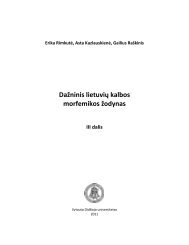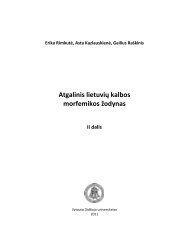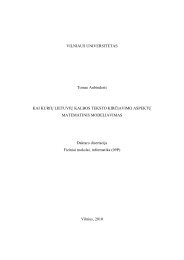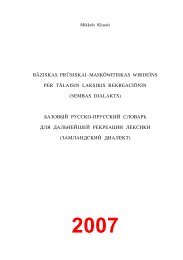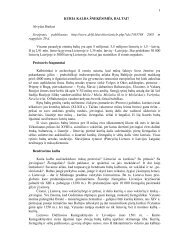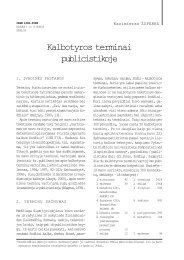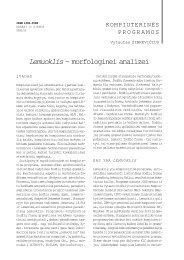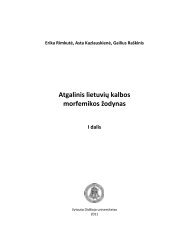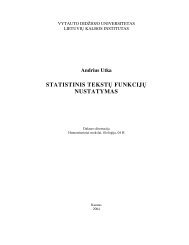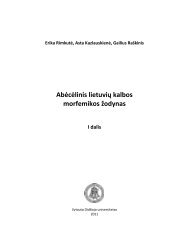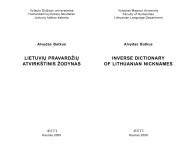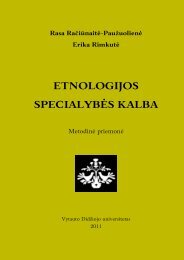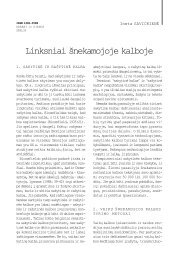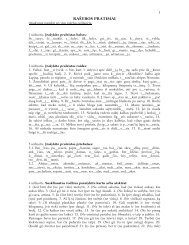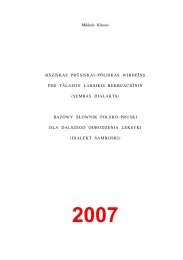HISTORICAL GRAMMAR OF OLD PRUSSIAN
HISTORICAL GRAMMAR OF OLD PRUSSIAN
HISTORICAL GRAMMAR OF OLD PRUSSIAN
You also want an ePaper? Increase the reach of your titles
YUMPU automatically turns print PDFs into web optimized ePapers that Google loves.
<strong>HISTORICAL</strong> <strong>GRAMMAR</strong> <strong>OF</strong> <strong>OLD</strong> <strong>PRUSSIAN</strong><br />
II ‘meat, body’, etc. This (Cat.) inflection was unaccented, and therefore<br />
shortened as -as, because the transition *-¯É > *-û after L, G did not occur,<br />
cf. `lgas III (not o`lgus) or a reduced ending in menses II (beside mensas<br />
III) – Endzelîns SV 62, Stang Vergl. Gr. 197, 293.<br />
* 107. Dat. sg. Pr. (adj., subst.) -‹ai < Balt. *-`i: tickray ‘right’,<br />
alkîniskai ‘trouble, hunger’. Forms (III) kanxtisku, spartisku etc. cannot<br />
be datives44 (thus Trautmann AS 225, Stang Vergl. Gr. 199) – cf. Endzelîns<br />
SV 63, PEÞ II 112 f. (s.v. kanxtisku), PEÞ IV 143 (s.v. spartisku).<br />
* 108. Acc. sg. (fem.) Pr. -an = *-‹an < Balt. *-`n: deinan ‘day’,<br />
rankan ‘hand’, aumûsnan ‘washing (off)’.<br />
Such forms as mergwan ‘maiden’ (I, II) have -wan instead of -an (cf.<br />
mergan III), cf. Endzelîns SV 63, PEÞ III 133 (s.v. mergo); otherwise<br />
Stang Vergl. Gr. 39. Similarly, (III) krixti`niskun ‘Christianity’ (beside<br />
christi`niskan) etc. have -un instead of -an; cf. Trautmann AS 226,<br />
Endzelîns SV 63 with bibl., PEÞ II 275 s.v. crixti`niskun45 .<br />
* 109. Nom. pl. (fem.) Pr. (E) *-`s (= *-¯És) < Balt. *-`s [> Lith.<br />
(þmƒon)-os (unaccented!)]: lauxnos ‘stars’, wayos ‘meadows’, etc.<br />
Forms (stai) gennai (III) ‘women, wives’, preibillîsnai (III) ‘promises’<br />
are innovations in accordance with the a-stem pattern nom. pl. (masc.)<br />
-ai, cf. Trautmann AS 228, Endzelîns SV 6346 .<br />
* 110. Gen. pl. ends in *-un as in a-stems (cf. * 98): menschon<br />
(1x I 910) = *menson = *mensun ‘bodies’.<br />
44 Why not! Cf. ftn’s 39, 43. – L.P.<br />
45 Forms acc. sg. fem. mergwan, crixti`niskun point to nom. sg. fem. mergu, *crixti`nisku with<br />
their -u < *-û < *` after L, G, plg. gallû (III) < *galwû < *galw` ‘head’ beside galwo (E). Since<br />
tautosyllabic diphthongs had been shortened already in common Baltic, the inflection acc. sg.<br />
fem. -an was short and could not turn into -un phonetically. Forms acc. sg. fem. -un, -wan arose<br />
analogically in accordance with nom. sg. fem. -u, but the form in -wan additionally underwent a<br />
contamination with a usual acc. sg. (fem.) -an: -un + -an = -wan. – L.P.<br />
46 A mistake (not an innovation) is credible, especially in preibillîsnai. Neverthess for the plausibility<br />
of stai gennai as a collective form (cf. Greek nom. pl. fem.!) see ftn. 43 and Palmaitis<br />
M.L. Borussica: 1. Stai Gennai – ein Nomen Collectivum? / Baltistica XXV (2) 126 f. – L.P.<br />
51



